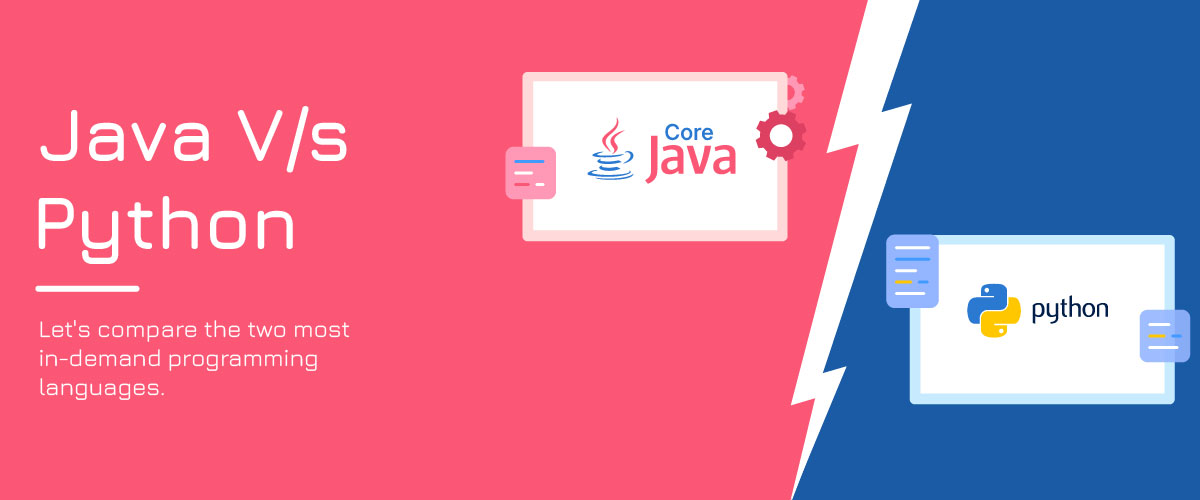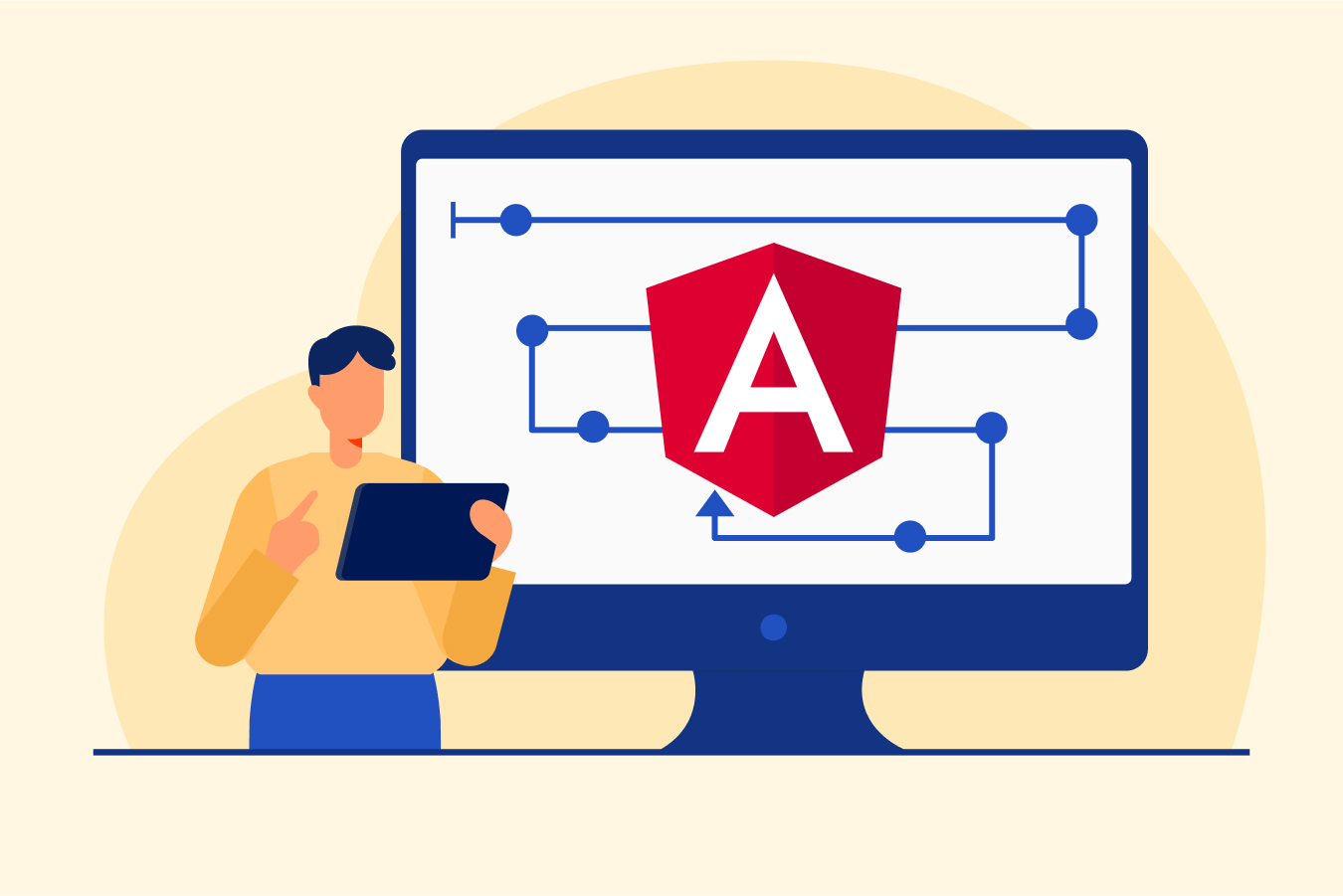Python Vs Java: Difference Between Java And Python
Java and Python are the two programming languages that are dominating the technology and software industry. Both of these languages make it possible to construct highly scalable solutions to real-world issues with efficiency, adaptability, and automation. Since the world is getting digitized and is evolving through new-age technologies like Artificial Intelligence (AI), Machine Learning (ML), and Data Science, it is only beneficial to learn the top programming languages. Let’s delve into the world of Python vs Java and understand the difference between Java and Python to learn more about them.
What is Java?
Millions of devices, including laptops, smartphones, gaming consoles, medical equipment, and more, employ the object-oriented programming language and software platform known as Java. Java’s syntax and principles are derived from C and C++ programming languages.
What is Python?
Python is a popular computer programming language used to create software and websites, automate processes, and analyze data. It is a general-purpose language, which means it may be used to make many various types of applications and isn’t tailored for any particular issues. Its adaptability and beginner-friendliness have elevated it to the top of the list of programming languages in use today.
The software that runs self-driving cars and Netflix’s recommendation engine are both developed using Python, one of the most well-liked programming languages in the world. It is also a comparatively easy language to learn and you can even learn it online by taking a Python course to understand it better. Since Python is a general-purpose language, it can be used for a variety of tasks, including data research, software and web development, automation, and everyday task completion.
Everything from website development to software testing to machine learning uses it. Both developers and non-developers can use it. Thus, one of the most widely used programming languages in recent years is Python.
Difference Between Java and Python
| Use Case | Java | Python |
|---|---|---|
| Enterprise Applications | It offers strong support for building large-scale applications. | Not as widely used in enterprise applications. |
| Android App Development | Widely used for Android app development. | Not commonly used for Android app development. |
| Game Development | Widely used for game development. | Not as commonly used for game development. |
| Data Analysis | Limited native support, but has libraries for data analysis. | Strong native support with powerful libraries. |
| Machine Learning | Good support with popular libraries like Apache Mahout, etc. | Strong native support with powerful libraries like TensorFlow, sci-kit-learn, etc. |
| Scientific Computing | Limited native support, but has libraries for scientific computing. | Strong native support with powerful libraries like NumPy, SciPy, etc. |
| Web Development | Popular for building web applications using Java EE. | Popular for web development using Django, Flask, and other frameworks. |
| Typing | Statically typed, requiring explicit type declarations. | Dynamically typed, allowing flexibility without explicit type declarations. |
| Code Readability & Formatting | Strict code organization and formatting conventions. | Emphasizes clean and concise code with significant indentation. |
| Performance | Generally fast due to compilation and JVM optimization. | Slower than Java due to interpretation, but performance improvements with libraries like NumPy. |
| Security | Strong security features with built-in mechanisms and libraries. | Slower than Java due to interpretation, but performance improvements with libraries like NumPy. |
| Salary Trends | Competitive salary in enterprise development and backend engineering. | Competitive salary in data science, web development, and scientific computing. |
Which is better Java or Python?
It is almost possible to give a definite statement regarding which language is better. As each language has its own advantages and drawbacks. The best way to choose the ideal language for you is to consider the needs of your projects and your expertise in each of the languages, and then decide.
Advantages of Java and Python: Comparison
Java is an older language when compared to Python, hence due to its legacy and credibility, it is faster in performance. Here are some of the advantages and drawbacks of Java and Python:
| Advantages of Java | Advantages of Python |
|---|---|
| Java is a platform-independent language. This means programs created in it may run without any changes on a variety of systems. | Python is a popular choice for novice programmers since it has a basic syntax and is simple to learn. |
| There are a lot of resources and tools accessible for Java development as Java has a sizable and active developer community. | Python offers a sizable and expanding number of strong libraries for web development, scientific computing, machine learning, and data analysis. Due to this, creating complicated apps is simple and doesn’t need starting from scratch. |
| Java is an object-oriented language, making it simpler to create intricate and scalable programs. Moreover, it enables traits like polymorphism, inheritance, and encapsulation. | Python is a language that can be executed without the requirement for compilation. This might facilitate and speed up development. |
| Java is a powerful language with capabilities like automated garbage collection, exception handling, and type checking that may aid with bug prevention and code quality enhancement. | It has a sizable and active developer community, therefore there are a lot of resources and tools accessible for Python development. |
| Java is a popular choice for building large-scale enterprise applications, and there are many frameworks and tools available for Java development. | Python is a flexible language that may be used for many different purposes, such as data analysis, machine learning, scientific computing, web development, and more. |
Drawbacks of Java Or Python: Comparison
| Drawbacks of Java | Drawbacks of Python |
|---|---|
| Due to frequent memory allocation and deallocation, Java’s automated garbage collection function can occasionally affect performance. | As Python is an interpreted language, it can often be slower than compiled languages like C or Java when working with big volumes of data or intricate algorithms. |
| Java code may be verbose, which can make it more time-consuming to develop and more challenging to read and comprehend. | Python’s use for developing mobile apps is limited compared to other languages like Java or Swift. This is mostly because of its performance restrictions and the fact that it needs an interpreter to function. |
| Java is a complicated language with many features and ideas that might be challenging for novice programmers to understand. | It is a system that makes sure only one thread is executing Python bytecode at once. As only one thread can be active at once, this might reduce the performance of multi-threaded programs. |
| Java programs often have a long startup time, which might make some apps less suited for them. | As Python is a dynamically typed language, a variable’s type can change while it is being used. This can impede code comprehension and increase the likelihood of runtime mistakes. |
| Java has already had several security flaws that might be dangerous for programs created in the language. | Python’s package management mechanism can occasionally result in dependence problems, which can make managing big projects challenging. |
Applications Of Java And Python: Comparison
Let’s discuss a few applications of Python and Java to know which is better for you to learn.
- Java is one of the oldest languages. It is majorly used for the legacy roles like that relating to maintenance and legacy systems. Specialization of Java lies in building backend services using the spring framework. However, it is used to create modern-day applications and websites too. You can learn Java by taking an online Java course to understand the language better.
- Python is a more trendy and modern language than Java, it is used majorly in new-age concepts and industries of Data Science, Machine Learning (ML), Artificial Intelligence (AI), and Computer Vision. Python is quite versatile and so it is used to create applications, websites, and embedded systems.
Python Vs Java: Speed And Efficiency
- Java’s Just-In-Time (JIT) compiler and concurrency capabilities are largely responsible for its performance. The Java Runtime Environment contains the JIT compiler. Converting bytecodes into native machine code “just in time”, boosts the performance of Java apps. The Java Virtual Machine (JVM) immediately invokes the compiled code. Compiling does not use CPU or memory resources because the code is not interpretive. This could theoretically make a Java program run as quickly as a native application.
- Python applications are interpreted, which causes runtime lag, whereas Java programs are natively compiled. The workload of the interpreter is increased by having to determine the variable type at runtime. Memory utilization is also impacted by remembering the object type of items fetched from container objects.
Also Read: Python Data Types
Python Vs Java: Quick Bug Fixes
- In Python, any errors that the programmer introduces won’t be discovered until that line of code is executed. This can result in operational failures and longer turnaround times.
- In Java, object mutations are not possible, whereas Python leaves objects open to mutation. This results in the creation of secure software.
Conclusion
Python and Java each have their advantages and disadvantages. Java is a statically typed language with a reputation for speed and scalability. It is also extensively utilized while creating Android apps. In contrast, Python is a dynamically typed language that emphasizes readability and simplicity, making it a well-liked option for machine learning, data analysis, and scientific computing. Both Java and Python have sizable, welcoming communities in addition to rich libraries and frameworks that speed up and facilitate development. They are both flexible languages that can be utilized for a broad range of applications.
FAQs
Python is considered as one of the easiest programming languages to learn.
Yes, you can get a job as a Python developer even if you are a fresher as most tech companies actively seek out Python as a skillset for developer profiles. You can check out Python jobs for freshers on various job platforms.
It is better to learn Python first as it is the easiest programming language to learn.
According to data, the average salary in India for both does not vary much and is close to around 4.5 LPA.





